Waterkeepers Meet in Alabama for Regional Summit
By: Patience Burke

Last month, Waterkeeper groups from more than a dozen different states descended upon the Magic City – Birmingham, Alabama – to attend the Gulf and South Atlantic Regional Summit.
Over 50 Waterkeeper groups were represented, with many sending not just Waterkeepers, but other essential members of their staff, as well. More than a quarter of those in attendance also contributed to the success of the Summit by participating as valued presenters.
Before the Summit officially kicked off, about a dozen early arrivals paid a visit to the Birmingham Civil Rights Institute. En route, we paused to reflect in Kelly Ingram Park, the location from which came some of the very first public images of the atrocious assaults made against civil rights demonstrators.
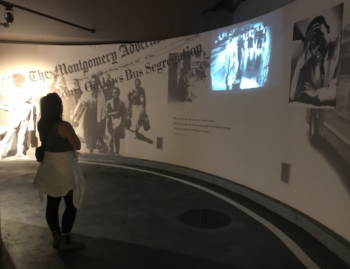
Birmingham was a deliberately selected destination for the Summit. The Waterkeeper movement has been actively engaged in implementing its Justice, Equity, Diversity, and Inclusion (JEDI) efforts for some time now. By hosting the Summit in Birmingham, we paid homage to those who sacrificed, while simultaneously recognizing that we have much further to go on the journey towards equal rights and representation for all.
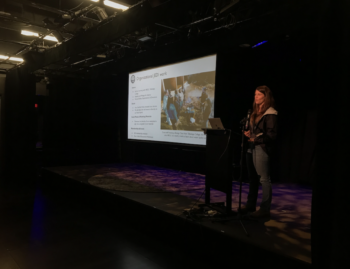
JEDI was woven in as a theme for nearly every panel held at the Summit. Our keynote, Dr. Danielle Larkin – board member for Summit host, Cahaba Riverkeeper – humbled everyone as she detailed the experiences of her family during the Civil Rights era.
Her grandfather, Arthur Shores, worked tirelessly alongside Martin Luther King, Jr. Dr. Larkin pulled from her own professional expertise in nursing to emphasize the common thread that binds her work in healthcare with Waterkeepers’ work in environmental protection.
“The keynote speaker, Danielle Larkin and her family story was a true gift to hear and be present for.” – Erin Donmoyer, Black-Sampit Riverkeeper
As Waterkeeper Alliance looks towards its 25th Anniversary next year, the Gulf and South Atlantic Regional Summit reflected an evolution that has occurred within the Waterkeeper movement. Our member organizations are growing up.
More than half of the 80+ advocates attending the Gulf and South Atlantic Regional Summit bore titles other than “Waterkeeper.” We had a Director of Community Engagement, a Technical Programs Specialist, a Communications and Administrative Director, an Upper Watershed Representative….you get the point.
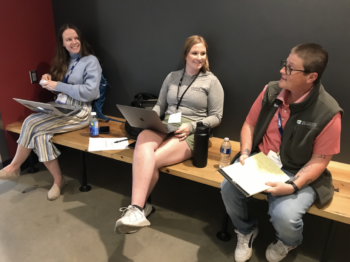
The work of a Waterkeeper is a dynamic and challenging responsibility, and fortunately, an increasing number of our member organizations are growing at a rate that enables them to share that responsibility with other dedicated team members, expanding the reach of their advocacy.
But still, not every Waterkeeper group yet finds themself in this position. Building an organization is hard, often thankless work. Sheer dedication is sometimes the only companion that a Waterkeeper may have. We recognize this in the Gulf and South Atlantic, many of us having once been there ourselves.
It is for this reason that we offered two panel tracks at the Summit, one focused on advocacy and another focused on mission-support topics such as Americorps, effective and compelling outreach, and financial management and planning.
“I brought back lessons learned and started implementing a new project right away. Just a few weeks after returning, I met with several people, including representatives of a local college to start working on building an AmeriCorps program.” – Dr. Abbey Tyrna, Suncoast Waterkeeper and Executive Director
We also tackled what is arguably the most pressing environmental challenge facing green groups today – climate change.
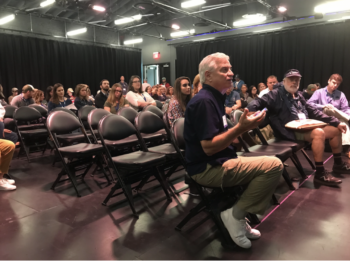
The nature of the global rush to find cleaner sources of energy has pitted traditional environmental causes against one another.
The degradation of mining versus the competing demand for critical minerals to build batteries…the ecological disruption of wind turbine installation versus the urgent need for additional renewable sources of energy…the clear-cutting for right of ways through forested areas versus the need to build additional transmission lines to transmit that renewable energy.
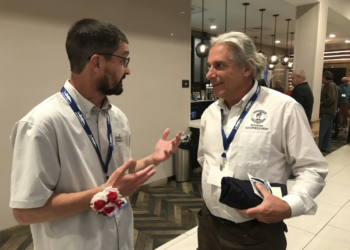
There are no easy answers, but when it comes to the task of responding to the real world, on the ground environmental impacts of climate change, you would be hard pressed to find someone better suited than a Waterkeeper.
Waterkeeper Alliance is uniquely positioned relative to other advocacy organizations because our strength comes from the incomparable expertise and passion of our locally-based member organizations.
Quintessential to the camaraderie of the Waterkeeper movement is a shared understanding that each of us is devoutly dedicated to the health and well-being of our waterways. It is from a place of respect that we share, that we learn, and that we grow to collectively tackle the most difficult of challenges.
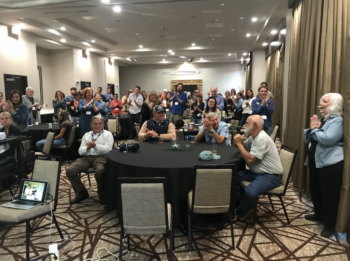
“It was valuable to come together and celebrate everyone’s hard work. Waterkeepers offer the best advice to other Waterkeepers.” – Anne Chamberlain, Outreach and Development Coordinator with Cahaba Riverkeeper
Even if we don’t always agree.
“I loved the lively debate about complex issues. I find real value in learning from my peers.” – Andy Hill, Watauga Riverkeeper
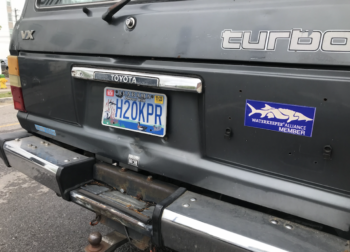
If you want to learn more about finding a Waterkeeper near you, drop me a line. It’d be my honor to connect you.